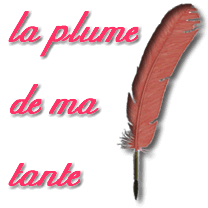
I wrote a new song last week based on the phrase ‘la plume de ma tante‘ (My aunt’s quill/pen/feather). This phrase cropped up in a conversation I had with friends a few weeks ago when we were talking about learning languages, and how languages are taught.
According to Wikipedia this phrase possibly appeared in French textbooks in the 19th century and early 20th century, and was designed to teach people French vowel sounds. Other phrases used in a similar way include Le petit bébé est un peu malade (the little baby is slightly ill), and Un bon vin blanc (a good white wine). An equivalent phrase, which appeared in the first Assimil English course for French speakers, is My tailor is rich.
While it’s unlikely you would often use such phrases in everyday conversation, they do have their uses: to illustrate aspects of pronunciation, to practise using various grammatical structures, and to learn vocabulary. Moreover they tend to be easier to remember if they are silly and/or bizarre. My song could be used to learn family words, how to say where things are, or are not, and words for furniture, clothes, animals, etc.
Here are the lyrics, a recording and a translation of my song:
La Plume de Ma Tante
Refrain
Où est la plume de ma tante ?
Dis-moi si tu sais où elle est.
Je l’ai vue ce matin je pense,
Mais maintenant elle a disparu.
Ce n’est pas sur la chaise de mon oncle,
Et c’est pas sous la table non plus.
Ce n’est pas dans le piano de mon grand-père,
Et ce n’est pas dans le seau de ma sœur.
Refrain
Ce n’est pas dans le frigo de mon frère
Et ce n’est pas dans sa poche non plus
Ce n’est pas dans le manteau de ma grand-mère,
Et ce n’est pas entre le marteau et l’enclume.
Refrain
Ce n’est pas derrière la dinde
Et ce n’est pas au-dessus du dromadaire
Ce n’est pas dans la piscine de mon papa
Et ce n’est pas dans le nez de ma nièce.
Refrain
My Aunt’s Quill
Chorus
Where is my aunt’s quill?
Tell me if you know where it is.
I saw it this morning, I think,
But now it has disappeared.
It’s not on my uncle’s chair,
And it’s not under the table either.
It’s not in my grandfather’s piano,
And it’s not in my sister’s bucket.
Chorus
It’s not in my brother’s fridge
And it’s not in his pocket either.
It’s not in my grandmother’s coat
And it’s not between the hammer and the anvil.
Chorus
It’s not behind the turkey,
And it’s not over the dromedary.
It’s not in my dad’s swimming pool,
And it’s not in my niece’s nose.
Chorus
The expression entre le marteau et l’enclume, which literally means “between the hammer and the anvil”, is the French equivalent of the English expressions ‘between a rock and a hard place’, and ‘between the devil and the deep blue sea’ – i.e. in a difficult situation.
There is also a musical entitled La Plume de ma Tante written and directed by Robert Dhery, and at least one other song that incorporates this phrase.
Pedants’ Corner:
should be :” je l’ai vue ce matin” (agrees with preceding direct object!). Written French is tricky as you can’t hear such differences.
Reminds me in a way of one of the songs on an old Anna Russell recording – spoof of a French art song – first lines: Je n’ai pas la plume de ma tante, mais j’ai le parapluie de Genvieve. And it continues in that vein using school-book phrases throughout.
Pedants’ Corner (# 2):
“Poche” (pocket) in verse 3 is feminine, so the line should read “..dans sa poche..”
It is fun to see that someone is so enthusiastic. About the pronunciation: “tu”, “disparu” and “du” rhyme with “vu / vue”. That is the vowel [ü].